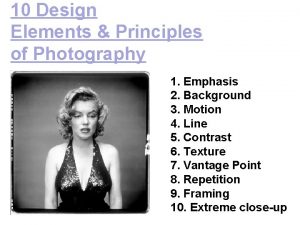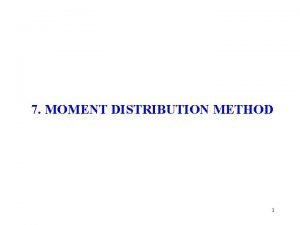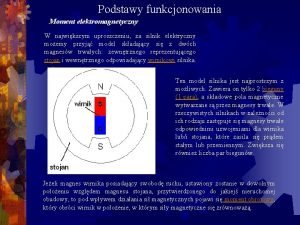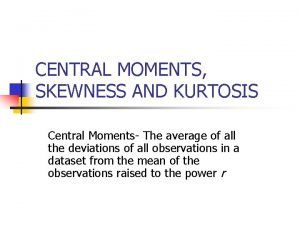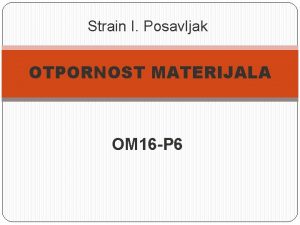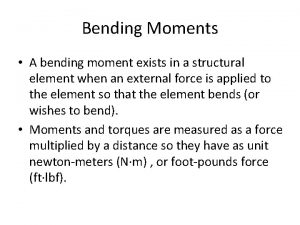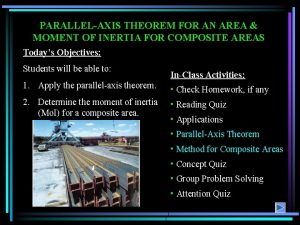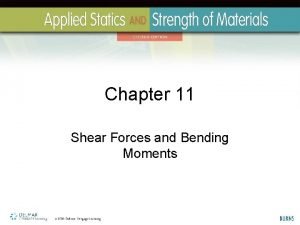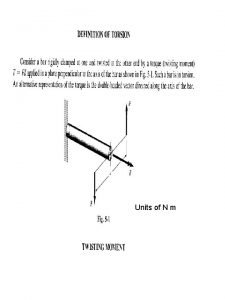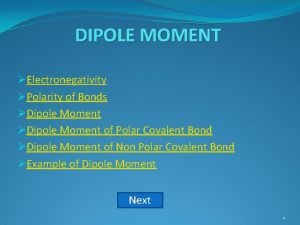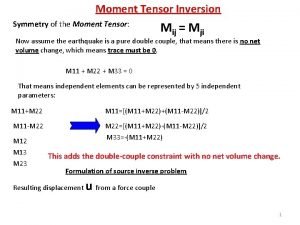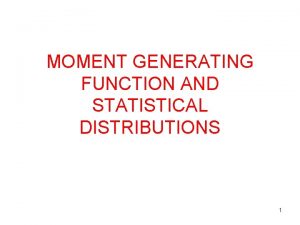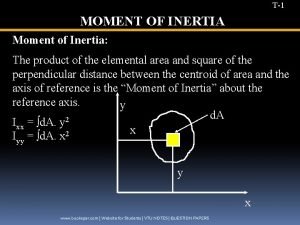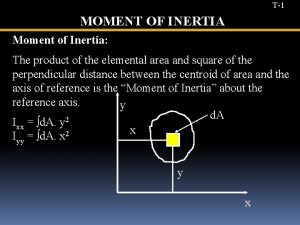Moment in 3 D Moment in 3 D

















- Slides: 17

Moment in 3 D

Moment in 3 D • In two-dimensional analyses it is often convenient to determine a moment magnitude by scalar multiplication using the moment-arm rule. In three dimensions, however, the determination of the perpendicular distance between a point or line and the line of action of the force can be a tedious computation. A vector approach with cross-product multiplication then becomes advantageous.

Moment: Vector Definition • In some two-dimensional and many of the three-dimensional problems to follow, it is convenient to use a vector approach for moment calculations.

Evaluating the Cross Product

Moment about an Arbitrary Axis

Varignon’s Theorem in Three Dimensions The sum of the moments of a system of concurrent forces about a given point equals the moment of their sum about the same point.

Problem-1 The turnbuckle is tightened until the tension in the cable AB equals 20 k. N (Figure). (i) Determine the moment of the tension T about point O. (ii) Determine the moment of the tension T about point B. z (iii)Calculate the moment of the tension T about line OC. Note that points B, C and D lie in the x-y plane. A T=20 k. N x 30 m D O 6 m B 5 m C 8 m E y

z A (0, 0, 30) T=20 k. N Solution (ii) As the line of action of 20 k. N force is passing through B, the force will not produce any moment about point B. That is MB = 0 30 m D x O 6 m B 5 m C 8 m (13, 6, 0) (8, 6, 0) E y (0, 0, 0)

z A (0, 0, 30) T=20 k. N 30 m D x O 6 m B 5 m C 8 m (13, 6, 0) (8, 6, 0) E y (0, 0, 0)

Couple Moment

Couple moment: Scalar formula Thus moment of a couple is same for all moment centers. 11

Couple moment: Vector formula Thus moment of a couple is same for all moment centers. 12

Direction of couple moment 13

Force-couple System A force acting on a body has the tendency 1. To push or pull the body in the direction of the force; and 2. To rotate the body about an axis which does not intersect the line of action of the force. This dual effect of a given force is often shown by replacing the given force by an equal-parallel force and a couple. This system of force and couple is known as forcecouple system. 14

Addition of two couple vectors Couple vectors obey all of the rules which govern vector quantities. Thus, in shown Figure, the couple vector M 1 due to F 1 and –F 1 may be added as shown to the couple vector M 2 due to F 2 and –F 2 to produce the couple M, which in turn can be produced by F and –F. 15

Problem A force of 400 N is applied at A to the handle of control level which is attached to the fixed shaft OB. Replace this force by an equivalent force at O and a couple. Describe this couple as a vector. 16

Solution 17
 Design elements in photography
Design elements in photography Bolt of uniform strength
Bolt of uniform strength In the moment acting
In the moment acting Margaret atwood the moment
Margaret atwood the moment Moment generating function of binomial distribution
Moment generating function of binomial distribution Moment distribution method
Moment distribution method Memory moment signpost
Memory moment signpost Preserve the moment
Preserve the moment Moment elektromagnetyczny
Moment elektromagnetyczny How to calculate skew
How to calculate skew Moment inercije kruga
Moment inercije kruga Max moment equations
Max moment equations The parallel-axis theorem for an area is applied between
The parallel-axis theorem for an area is applied between Inclined beam shear and moment diagram
Inclined beam shear and moment diagram The defining moment in greek history is the wars
The defining moment in greek history is the wars Units of torsion
Units of torsion Dr. jean watson
Dr. jean watson Moment of inertia of shapes
Moment of inertia of shapes
